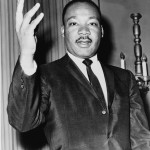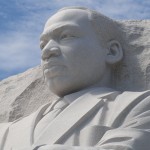 As we celebrate the birth of Dr. Martin Luther King, MLK, it’s impossible not to reminisce on the connection with Abraham Lincoln, ABE. The two men are linked forever because of Lincoln’s emancipation proclamation and King’s reference to it in his “I have a dream” speech.
As we celebrate the birth of Dr. Martin Luther King, MLK, it’s impossible not to reminisce on the connection with Abraham Lincoln, ABE. The two men are linked forever because of Lincoln’s emancipation proclamation and King’s reference to it in his “I have a dream” speech.
Lincoln issued the final Emancipation Proclamation on January 1, 1863. Announced as a necessary war measure in dry legal language because that was the authority Lincoln had for such a dramatic step, the Proclamation had ramifications far beyond the effect it had on the United States’ ability to win the Civil War. It continued, and hastened, the process of ending slavery in America, the slavery that the slaveholding Southern states had gone to war to protect and expand. The Proclamation, other acts of Congress, and the Thirteenth Amendment to the Constitution ensured that slavery would end as an institution. It didn’t, however, end the forces of racism, discrimination, and the physical intimidation that to this day have blocked creation of a society of equality. Lincoln understood there was more to do but was assassinated by those forces to keep him from working toward a new birth of freedom.
Martin Luther King understood this as well. In 1963, MLK recognized the importance of the one hundredth anniversary of the Emancipation Proclamation. On the steps of the Lincoln Memorial, King referenced the significance as he began his speech with:
Five score years ago, a great American, in whose symbolic shadow we stand today, signed the Emancipation Proclamation. This momentous decree came as a great beacon light of hope to millions of Negro slaves who had been seared in the flames of withering injustice. It came as a joyous daybreak to end the long night of their captivity.
But one hundred years later, the Negro still is not free. One hundred years later, the life of the Negro is still sadly crippled by the manacles of segregation and the chains of discrimination. One hundred years later, the Negro lives on a lonely island of poverty in the midst of a vast ocean of material prosperity. One hundred years later, the Negro is still languished in the corners of American society and finds himself an exile in his own land. And so we’ve come here today to dramatize a shameful condition.
King linked the continuing struggle for equal rights to the unfinished business of Lincoln’s proclamation. Again, forces had bludgeoned human rights through physical intimidation, discriminatory laws, and racial gerrymandering.
We are now three score and one years from King’s iconic speech. And still, we have the same forces using violence and law to restrict the rights of fellow Americans.
We have work still to do.
As Lincoln noted in his December 1862 message to Congress: “Fellow-citizens, we cannot escape history. We…will be remembered in spite of ourselves….The fiery trial through which we pass will light us down in honor or dishonor to the latest generation.”
The choices we make today will be remembered by our children and our grandchildren, just as the choices of our grandparents during Jim Crow, the rise of Naziism and Fascism, and the civil rights struggles of Dr. King and others are remembered by us. In Lincoln’s time, there were those who fought to save the Union and those who fought to destroy it. To which group do we now identify?
The answer, for each of us individually and as a nation, will determine if in another four score or five score or ten score years we are seeking another ABE, another MLK, to determine if we “shall nobly save or meanly lose the last best hope of earth.”
Martin Luther King had a dream. He now has his own monument on the National Mall, not far from the monument to Lincoln we call the Lincoln Memorial. It behooves us on this Martin Luther King Day to take the time to visit and think about both men, their contributions, and how each of us can emulate them to save us from ourselves. We must all have a dream.
[Photo of Martin Luther King in WikiCommons, public domain]

Lincoln: The Fire of Genius: How Abraham Lincoln’s Commitment to Science and Technology Helped Modernize America is available at booksellers nationwide.
Limited signed copies are available via this website. The book also listed on Goodreads, the database where I keep track of my reading. Click on the “Want to Read” button to put it on your reading list. Please leave a review on Goodreads and Amazon if you like the book.
You also follow my author page on Facebook.
David J. Kent is President of the Lincoln Group of DC and the author of Lincoln: The Fire of Genius: How Abraham Lincoln’s Commitment to Science and Technology Helped Modernize America and Lincoln: The Man Who Saved America.
His previous books include Tesla: The Wizard of Electricity and Edison: The Inventor of the Modern World and two specialty e-books: Nikola Tesla: Renewable Energy Ahead of Its Time and Abraham Lincoln and Nikola Tesla: Connected by Fate.



 Martin Luther King Jr. had a dream. A dream in which “
Martin Luther King Jr. had a dream. A dream in which “ On this day we celebrate and honor the life of Martin Luther King, Jr. More importantly, we relive the struggle to break the institutionalized discrimination against a large percentage of our fellow Americans. As Lincoln once suggested in a different situation, it is altogether fitting and proper that we should do this.
On this day we celebrate and honor the life of Martin Luther King, Jr. More importantly, we relive the struggle to break the institutionalized discrimination against a large percentage of our fellow Americans. As Lincoln once suggested in a different situation, it is altogether fitting and proper that we should do this. Barack Obama has said that the two people he admires most are Martin Luther King and Abraham Lincoln. Perhaps this shouldn’t be much of a surprise. In Dreams From My Father, Obama recounts his trials growing up as a young black man with mixed race heritage. While clearly a different upbringing than that of most black men living in America, he did experience the prejudices that were openly prevalent then, and more subtle and covert today.
Barack Obama has said that the two people he admires most are Martin Luther King and Abraham Lincoln. Perhaps this shouldn’t be much of a surprise. In Dreams From My Father, Obama recounts his trials growing up as a young black man with mixed race heritage. While clearly a different upbringing than that of most black men living in America, he did experience the prejudices that were openly prevalent then, and more subtle and covert today. Today is the anniversary of the 1968 assassination of Dr. Martin Luther King, the famed civil rights leader. He was shot April 4th while standing on the balcony outside his room at the Lorraine Motel in Memphis, Tennessee. Dr. King’s contributions and impact on American society are well known, and yet immeasurable. The following short YouTube clip explains the assassination well:
Today is the anniversary of the 1968 assassination of Dr. Martin Luther King, the famed civil rights leader. He was shot April 4th while standing on the balcony outside his room at the Lorraine Motel in Memphis, Tennessee. Dr. King’s contributions and impact on American society are well known, and yet immeasurable. The following short YouTube clip explains the assassination well: Obama did not mention Lincoln by name during his
Obama did not mention Lincoln by name during his 
 This is Part Two of a series about inauguration speeches, in particular that of Abraham Lincoln, whose bible was used by President Barack Obama for both his first and second inaugurations. It is best to
This is Part Two of a series about inauguration speeches, in particular that of Abraham Lincoln, whose bible was used by President Barack Obama for both his first and second inaugurations. It is best to  Barack Obama, our first African-American President, took his oath of office in 2013 on the day we celebrated the birthday of the great civil rights leader,
Barack Obama, our first African-American President, took his oath of office in 2013 on the day we celebrated the birthday of the great civil rights leader, 








